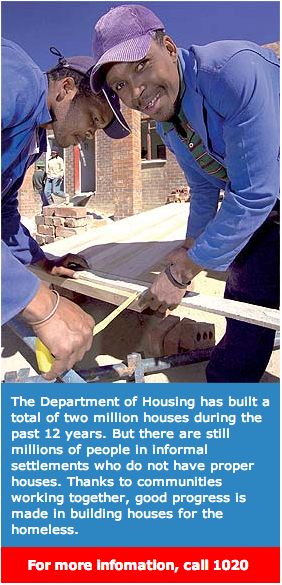 Building houses for South Africa's millions of homeless people is one of government's number one goals. To reach its target of getting rid of informal settlements by 2014, government has a number of plans in place. One of these is to work together with communities.
Building houses for South Africa's millions of homeless people is one of government's number one goals. To reach its target of getting rid of informal settlements by 2014, government has a number of plans in place. One of these is to work together with communities.
The People's Housing Process is a government programme which provides funds to communities to help them build houses. The funds given by the programme only goes to registered associations.
FEDUP
One of the associations that receives money is the Federation of Urban and Rural Poor Program (FEDUP). FEDUP is a community programe that encourages communities to build houses for themselves. By working together to build houses the communities not only get houses, but also gain skills because they do the work themselves.
To qualify for government funds, associations like FEDUP must not only be registered to build houses, but also for training
skills like project management. FEDUP is represented in all nine provinces and has helped communities build 20 000 houses in South Africa since 1996.
FEDUP does not depend on government funding alone. Its members also have to contribute money into a savings account.
FEDUP manages the daily and monthly savings of members, and until now R10 million has been saved from its 80 000 members. The money is expected to benefit over 500 000 people.
FEDUP helps beneficiaries to choose housing plans they can afford and invites the local authorities for quality inspections of the building.
Symbol of progress
One of the houses which FEDUP has contributed to building belongs to 75-year-old Nothima Kala. Her shack has been pulled down and a proper house built on the site. It stands a symbol of progress in the Joe Slovo Informal Settlement in the Eastern Cape.
Joe Slovo community members hope to see 1 600 residents of the informal settlement owning their own houses by the end of 2007.
The success story of Joe Slovo Informal Settlement is thanks to the residents' savings. They save according to what they can afford even if it is as little as R1.
- BuaNews



 Facebook
Facebook Twitter
Twitter WhatsApp
WhatsApp